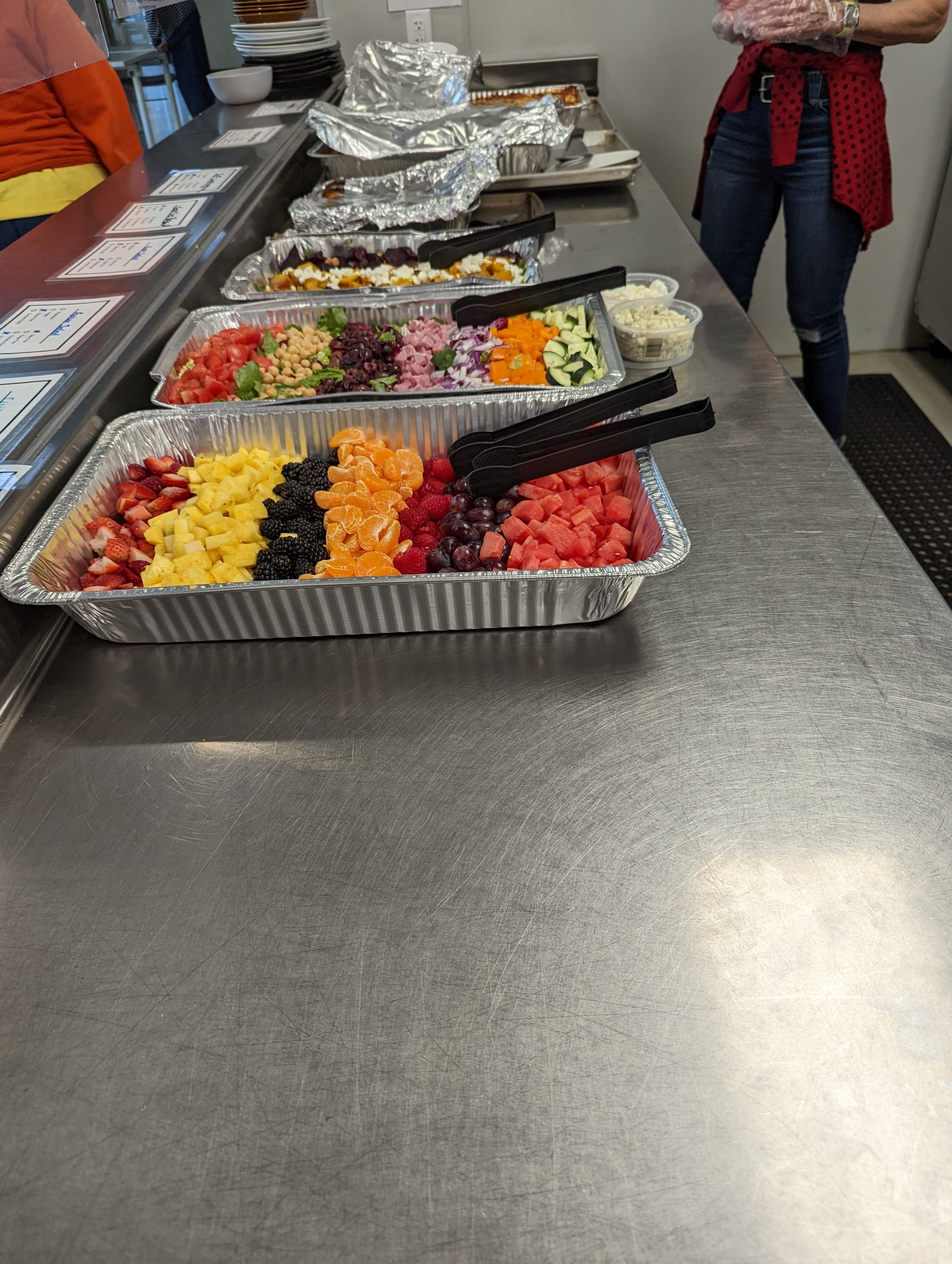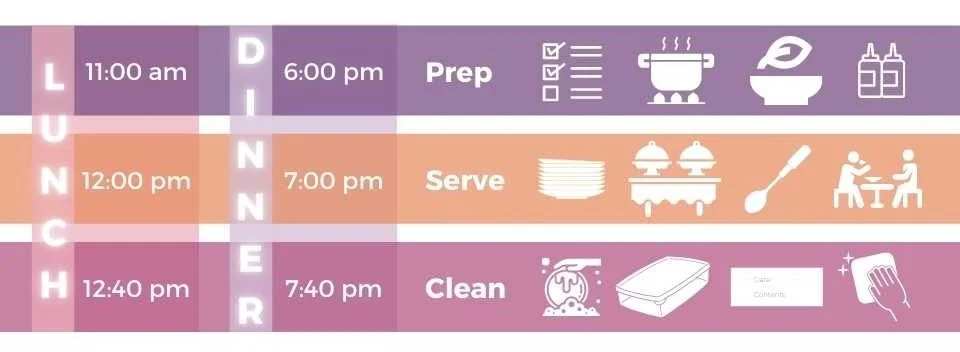
Meal Program Information
Meal Program Navigation
Top ^
IMPORTANT UPDATES AND INFORMATION regarding Meal Program
Important update for meal providers:
Provider shifts will be closed on Sundays for the following week in order to prevent last-minute changes during the week. Please make sure you sign up by Sunday for the following week if you would like to provide a meal! If you are providing and serving a meal, there is a limit of 6 volunteers in total.
Serving shifts will now be closed for sign-ups 48 hours in advance. Please make sure you sign up at least two days ahead of when you would like to serve a meal! Server shifts will now be limited to 4 people.
Additional Meal Program Updates:
New aprons have been ordered as a token of gratitude for all you do for our community. Please enjoy.
We will be transitioning our volunteer management platform from CERVIS to Bloomerang in the coming months. We hope Bloomerang will be a more user-friendly platform for volunteers and donors and appreciate your patience and understanding in advance as we work through this change. Please be on the lookout for updates via email for more info coming soon!
We hope these changes will help our program run more smoothly and provide the best experience for you and the guests we serve. As always, we appreciate your feedback!
Top ^
Weekly Meal Plans
Please remember to email your menu so we can include it on the Weekly Meal Plan, which is posted in the dining room for shelter guests.
Top ^
Provide a Meal
Please provide 50 servings.
No current dietary restrictions - While there are some guests who express strong opinions about food restrictions, the reality is that we have a population that is constantly in flux and with the potential for day-to-day changes it has become untenable to restrict everything that guests have allergies or intolerances to, and frankly is just not fair to the other guests who want diversity and love variety. Further, from feedback I've taken from other providers, it became so limiting and burdensome to try to accommodate the myriad of differing perceived needs and makes it hard for providers to cook from the heart and (in some cases) even honor their recipes and desire for a well-seasoned dish. With this all in mind, we now ask that you be very familiar with the ingredients you've used to prepare your meals and come prepared to answer any questions, but other than that it is simply not fair to the greater number of people to be so restrictive to attempt to accommodate a few. We have now posted a list of the most common ingredients known to trigger allergies (posted on a pink sheet by the hot food beds) along with some bright orange labels for you to use, but really it is now a matter of guests asking questions about ingredients and advocating for their health rather than placing the burden on providers. While some people have expressed they are not happy about this changed policy, the vast majority of guests and providers find it liberating and I hope you do too! Please just strive to provide healthy food and infuse it with some love, and everything will be wonderful. Do not take any criticism to heart-- we post a menu for the guests to see every Monday afternoon, providing ample opportunity for those who are restricted or simply just picky eaters to be able to make accommodations, as well as providing three meals and two snacks every day. Currently, the only major points of seriousness: one allergy to pineapple and two allergies triggered by coconut and all three individuals know to ask questions about content. No one goes hungry due to allergies, so cook from your heart
Help nourish our guests by donating a healthy, balanced meal. This opportunity is open to individuals or small groups. Families are welcome. If you plan to volunteer on-site at the shelter, please limit your group to 6 volunteers due to the size of our kitchen.
You are welcome to cook a meal in our commercial kitchen at the shelter, cook a meal in your home, or order a meal from a restaurant to be delivered to the shelter. If you are dropping off a meal, we are happy to finish the meal on site.
Plan a complete menu with a main dish, side dish(es), salad(s), accompanying condiment(s), beverages, and dessert as your budget allows. A unified meal rather than small amounts of many things expedites the meal service.
Purchase all ingredients and prepare the meal. Meal costs vary depending on menu and shopping location) on planned meals.
Dropping off a meal
Deliver the meal components no later than 11:00 am for lunch or 6:00 pm for dinner on the date you are scheduled.
Use large disposable rectangle aluminum pans.
Write the following on the outside of the meal containers:
Scheduled date for your meal
Lunch or Dinner
Name of the food item
Directions for reheating, cooking, or serving (tip: print the recipe you use, and tape it to the top of the container)
Any ingredient(s) from the dietary restrictions list that you included in the food item
Top ^
Shelter Meal Schedule
Top ^
Serve a Meal
Serving a meal and joining our guests to eat is where many volunteers get their start and requires no financial contribution. We are looking for friendly, caring volunteers to assist with meal service at The Delores Project. As a meal server, you play a key role in raising the level of hospitality that we provide our guests each day. We ask meal servers to:
Prepare the planned meal or finish preparing the donated meal.
Clean and set-up the dining room for meal service.
Serve the meal to guests.
Put away leftovers and clean up following meal service.
Follow the guidelines, policies, and procedures for volunteering at The Delores Project, including provided food safety rules and guidelines.
Top ^
Food Safety
Please follow all food safety guidelines mandated by the Department of Public Health & Environment as you prepare and serve food to prevent food-borne illnesses within our community.
Practice Good Hygiene Avoid Cross Contamination Maintain Appropriate Temperatures Practice Good Hygiene
Wash hands regularly, including:
before, during, and after preparing food;
after using the restroom;
after touching bare skin, trash, dirty dishes, uncooked eggs, raw meat, poultry, seafood, or their juices;
and after blowing your nose, coughing, sneezing, using tobacco, or eating.
Wear gloves when handling, preparing, and serving food. Keep in mind that your gloves become your second skin so keep them clean. Change gloves that rip or might be contaminated. Change gloves between working with raw and ready-to-eat foods. Throw gloves away after use. Never wash or re-use gloves.
Never touch ready-to-eat food with bare hands. Handle all food items with a utensil (spoon, tongs, etc) instead.
Avoid Cross Contamination
Clean and sanitize all food preparation surfaces before, during, and after food preparation.
Avoid cross contamination by using separate cutting boards, dishes, and utensils for produce, meat, poultry, seafood, and eggs.
Keep raw meat away from other food to prevent cross contamination.
Wash and sanitize surfaces that come in contact with raw meat.
Wash hands after handling raw meat.
Maintain Appropriate Temperatures
Bacteria multiply rapidly between 40 ° F and 140 ° F. To keep food out of this "Danger Zone," keep cold food cold and hot food hot. These foods include:
Animal products (includes eggs, dairy products)
Cooked starches (rice, beans, pasta, or potatoes)
Fruits and vegetables as follows: cooked vegetables, tofu, sprouts such as alfalfa or bean sprouts, or cut melons
Cold foods should be held at 40 ° F or colder. Keep items in a fridge or freezer or place food in containers on ice.
Hot foods should be held at 140 ° F or warmer. Keep hot food in an oven or use the Hotwell drop-ins when in the shelter kitchen.
Cook food to recommended temperatures. Use a food thermometer to check the internal temperature of food. Check in several places to be sure food is cooked to a safe temperature. Recommended temperatures include:
165 ° F for poultry, stuffed meat or fish, pasta, soups, stews, casseroles, and reheated foods
160 ° F for ground meats and eggs that are cooked and held for service, such as scrambled
145 ° F for whole beef, lamb, pork, fish, shellfish, and eggs that are broken, cooked, and served immediately
Potentially hazardous food can be at room temperature for up to two hours while you are preparing or transporting it. It must be thrown away if it is left out for more than 2 hours at room temperature.
Ready-to-eat food must be served within three days. Food must be labeled with the date prepared and the item name.

